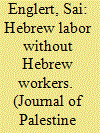|
|
|
Sort Order |
|
|
|
Items / Page
|
|
|
|
|
|
|
| Srl | Item |
| 1 |
ID:
193007


|
|
|
|
|
| Summary/Abstract |
The Histadrut was founded in 1920 to organize the so-called Zionist conquest of labor, which aimed to exclude Palestinian workers from the economy. While this ideology was central to the Yishuv, labor shortages and settler-colonial expansion following the establishment of the State of Israel in 1948 led to the integration of Palestinian workers in the workforce. Focusing on the construction industry, this article explores the ways in which the Histadrut’s contemporary membership structure, collective agreements, and relationship to the Israeli state serve to further institutionalize a highly racialized and segregated sector. Palestinian and migrant construction workers toil in dangerous circumstances for low pay, without union protection, and under the supervision of unionized Jewish managers and engineers.
|
|
|
|
|
|
|
|
|
|
|
|
|
|
|
|
| 2 |
ID:
167659


|
|
|
|
|
| Summary/Abstract |
The Israeli right—an alliance of neoliberal parties and settler organizations—has become the undisputed and seemingly undisplaceable political leadership of the state over recent decades. This transformation has been associated, both in Israel and internationally, with successive Likud-led governments in general, and their allies within the settler movement. A recurrent theme within analyses of this rise is the claim, made by journalists, academics and activists alike, that fascism is rearing its head in Israel, both in government and on the streets. This article argues that an analysis of Israel’s Labour Zionist history and confronting the claims made by its contemporary supporters, in the face of the Zionist right’s dominance, in fact highlights long-term political continuities and undermines claims of rising fascism. By building on critical literature on the politics of memory, this paper further discusses how a romanticized vision of the past, is central to current attempts by Labour Zionism to re-organize itself while whitewashing its own history. Finally, this article shows that a focus on history, and an analysis of the construction of collective memory, uncovers the ways in which the contemporary Zionist right has emerged from the foundations built by Labour Zionism itself.
|
|
|
|
|
|
|
|
|
|
|
|
|
|
|
|
|
|
|
|
|